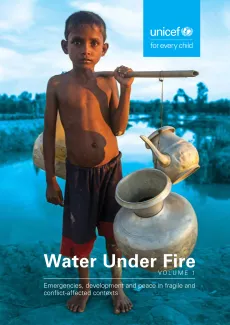Report
Water Under Fire (volume 1)
Author: Tim Grieve
Year: 2019
Publisher: UNICEF
Emergencies, development and peace in fragile and conflict-affected contexts
In fragile and conflict-affected contexts 420 million children lack basic sanitation and 210 million children lack access to safe drinking water. UNICEF launched the Water Under Fire campaign in March 2019 to draw global attention to three fundamental areas where changes are urgently needed to secure access to safe and sustainable water and sanitation in fragile contexts.
This first volume in the campaign’s three-report series is dedicated to the humanitarian–development–peace nexus, which links the 2030 Agenda for Sustainable Development, the United Nations sustaining peace agenda and the core responsibilities of the United Nations Secretary-General’s Agenda for Humanity. Drawing out these crucial linkages, the report presents practical and evidence-based water and sanitation solutions that can be replicated and scaled up. It highlights the need for leadership to bring about immediate action to accelerate water and sanitation service delivery in fragile and conflict-affected contexts; prevent water-related tensions between groups and political entities; and ensure the right to water and sanitation for every child.
Water Under Fire (vol 1) - Emergencies, development and peace in fragile and conflict-affected contexts
External Link
Open linkL’eau sous le feu des bombes (volume 1)
External Link
Open linkEl agua bajo el fuego (volumne 1)
External Link
Open linkفصقلا تحت هايملا (1 دلجملا
External Link
Open linkRating
Would you like to see other resources here?
Give us your feedback"*" indicates required fields
Related Resources and Tools
“They Know What We Don’t:” Meaningful Inclusion of Lgbtiq People In Humanitarian Action
This report explores how the humanitarian system is responding to the needs of lesbian, gay,bisexual,…
Women Lead in Emergencies. Global Learning Evaluation Report
CARE’s Women Lead in Emergencies (Women Lead) model has been developed to operationalise CARE’scommitment to…
Localisation in Humanitarian Leadership
The study evaluates the quality of engagement and enabling factors for increased local/national NGO participation…
Global Humanitarian Overview 2025
The Global Humanitarian Overview is an annual assessment of global humanitarian needs and how to…
The role of Women and Women-led/ Women-rights organizations in the Humanitarian WASH Sector and Coordination
This work aims to understand the experiences of women in Humanitarian WASH Coordination and Leadership.…
Key Questions and Considerations for Donors at the Triple Nexus: Lessons from UK and Sweden
This report is part of a series of studies intended to share emerging lessons andapproaches…
“They Know What We Don’t:” Meaningful Inclusion of Lgbtiq People In Humanitarian Action
This report explores how the humanitarian system is responding to the needs of lesbian, gay,bisexual,…
Women Lead in Emergencies. Global Learning Evaluation Report
CARE’s Women Lead in Emergencies (Women Lead) model has been developed to operationalise CARE’scommitment to…
Localisation in Humanitarian Leadership
The study evaluates the quality of engagement and enabling factors for increased local/national NGO participation…
Global Humanitarian Overview 2025
The Global Humanitarian Overview is an annual assessment of global humanitarian needs and how to…
The role of Women and Women-led/ Women-rights organizations in the Humanitarian WASH Sector and Coordination
This work aims to understand the experiences of women in Humanitarian WASH Coordination and Leadership.…
Key Questions and Considerations for Donors at the Triple Nexus: Lessons from UK and Sweden
This report is part of a series of studies intended to share emerging lessons andapproaches…
Still have questions?
You could not find the information you were looking for? Please contact our helpdesk team of experts for direct and individual support.


